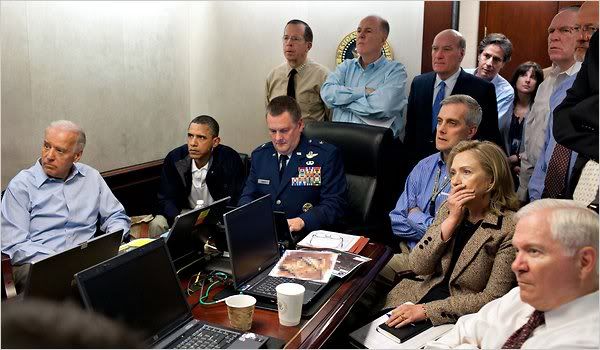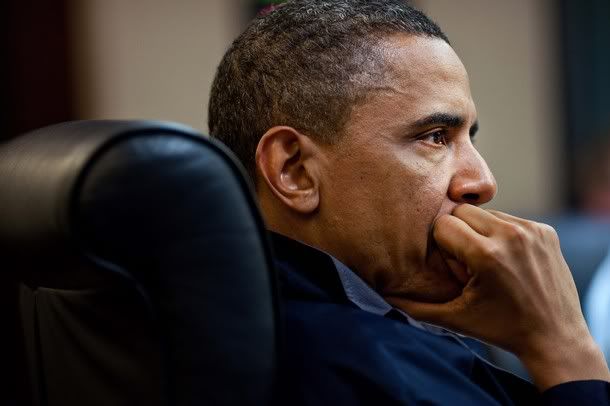
When I first heard the quote from John Brennen that Obama's go-ahead on the mission to get Bin Laden was "one of the most gutsiest calls of any president in recent memory," I cringed a bit. It doesn't help to overstate the case.
But as we learn more about the context in which the decision was made, it feels pretty accurate.
As more than a dozen White House, intelligence and Pentagon officials described the operation on Monday, the past few weeks were a nerve-racking amalgamation of what-ifs and negative scenarios. "There wasn't a meeting when someone didn't mention 'Black Hawk Down,' " a senior administration official said, referring to the disastrous 1993 battle in Somalia in which two American helicopters were shot down and some of their crew killed in action. The failed mission to rescue hostages in Iran in 1980 also loomed large.
Administration officials split over whether to launch the operation, whether to wait and continue monitoring until they were more sure that Bin Laden was really there, or whether to go for a less risky bombing assault. In the end, President Obama opted against a bombing that could do so much damage it might be uncertain whether Bin Laden was really hit and chose to send in commandos. A "fight your way out" option was built into the plan, with two helicopters following the two main assault copters as backup in case of trouble...
Mr. Panetta told the group that the C.I.A. had "red-teamed" the case -- shared their intelligence with other analysts who weren't involved to see if they agreed that Bin Laden was probably in Abbottabad. They did. It was time to decide.
Around the table, the group went over and over the negative scenarios. There were long periods of silence, one aide said. And then, finally, Mr. Obama spoke: "I'm not going to tell you what my decision is now -- I'm going to go back and think about it some more." But he added, "I'm going to make a decision soon."
Sixteen hours later, he had made up his mind. Early the next morning, four top aides were summoned to the White House Diplomatic Room. Before they could brief the president, he cut them off. "It's a go," he said.
This is the steely intelligent kind of courage that too often goes unnoticed by our chest-thumping, flag-waving opponents. Not only were there risks to the people involved. But President Obama knew that if he tried such a precision approach and failed, he'd never hear the end of it from the Republicans and I'd also guess more than a few Democrats. But he gathered all of the information he could and made the call. That's what a leader does.





No comments:
Post a Comment